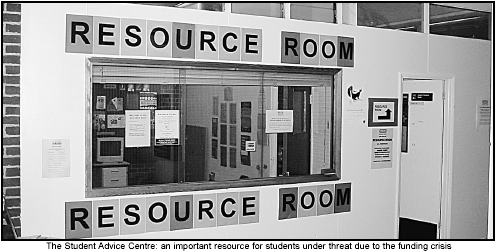
by HANNAH SEYFERT
The financial crisis faced by the Union is
becoming an increasing cause for concern.
At last November’s AGM, students voted to
stop spending Union reserves and to demand
that the University meet the shortfall in the
Union’s budget.

The Union is thus mandated not to start spending
its reserves when the deficit in the budget kicks
in. According to Finance Officer David Mooney, however,
the Union is set to reach its deficit limit as early
as Week 8. So, with the end of term fast approaching,
the Union draws ever nearer to potential closure.
It is essential that the University meets the shortfall
in the Union budget if the Union is to stay open.
Failure to do so will force the Union to strike.
Additional financial support from the University is the
only way to resolve the under-funding of the Union,
but there is growing anxiety that senior management
at the university may not step in to help. David
Mooney assured the badger that the sabbatical team
and elected Union representatives would continue to
fight the Union’s cause. ‘We will carry on insisting
that the university finally understands what the
Union does - it represents 12,000 students.’ After all,
the students are the very reason the university exists.
Mooney views the student body to be the university’s
employer - ‘senior management should be reacting
to the demands of their employer,’ he added.
The current concerns of Union officials have been
compounded recently by the financial struggles of
the Student Advice Centre (SAC). The SAC is an
invaluable service for thousands of students, and is
the only service provider of its kind on campus.
Massive lack of funding, however, means the SAC
has now reached crisis point.
There are two advisers at the SAC who run dropin
sessions and see people by appointment. Despite
a huge 165% increase in enquiries at the centre
between 2001 and 2002, there has been no extra
funding from the university. The result of this is that
the centre is being seriously overworked. Last term
alone, the two advisers employed by the SAC
worked 170 hours over-time between them. Due to
the growing rise in student debt, advisers are now
required to deal with more complex cases. A
fifteen minute interview with a student who needs advice
can generate up to 38 hours work for the adviser
involved in the case. The SAC desperately need an
additional adviser to cope with the high demand for
their services. The Union has made it clear to senior
management that a third adviser is the only solution
to the SAC’s problem. Though the university recognises
the SAC as a valuable service and have resolved
to sort out the problem, negotiations are still underway
over the employment of a third adviser.
Welfare Officer Marianne Lemond remains concerned
about the future of the SAC. She is keen to
stress the severity of the financial problem faced by
the SAC but reassures students that, ‘nobody seeking
advice will be turned away.’

|
